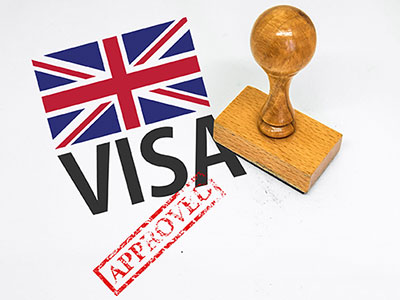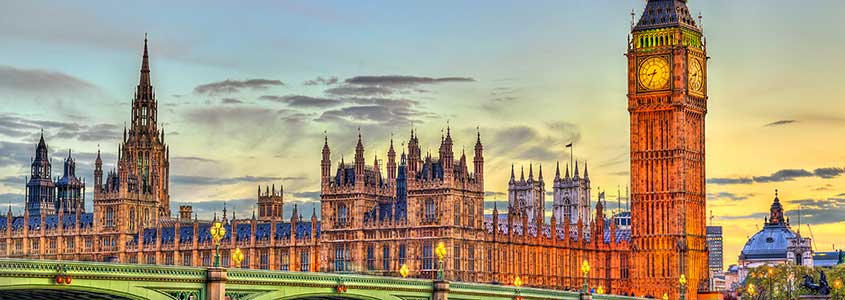Residence in the United Kingdom
For decades London (England) has been one of the few select international hot spots where wealthy families tend to take up residency. London offers political and economic stability, excellent health care facilities, renowned international schools and universities, easy access to financial services, and a cosmopolitan atmosphere which is hard to match anywhere else in the world.
Together with the non-domiciled taxation system which is available to foreigners relocating to England, these are the main elements why wealthy families choose to relocate to England.
This text is not yet updated with respect to the outcome of the Brexit process – so far non-domiciled taxation remains as it was.
England’s history (the United Kingdom)
England is part of the United Kingdom of Great Britain and Northern Ireland (hereinafter referred to as; the United Kingdom or the UK). Wales, Scotland and Northern Ireland also form part of the UK.
England has been a sovereign state since the 10th century. At that time it was referred to as the Kingdom of England. As of the end of the 13th century it factually also included most of the Principality of Wales. From a legal perspective Wales only became officially part of the Kingdom of England in the first half of the 16th century. Two Acts of Union, passed in Scotland in 1706 and in England in 1707, united the Kingdom of England and the Kingdom of Scotland into one United Kingdom, named the Kingdom of Great Britain. At that moment in time they already had the same monarch, Queen Anne.
Something similar happened in the year 1800 when the Kingdom of Great Britain and the Kingdom of Ireland passed similar Acts of Union and per 1801 the sovereign state of the United Kingdom of Great Britain and Northern Ireland was formed, nowadays commonly referred to as the United Kingdom or Great Britain.
The British Empire
In the 18th and 19th century the United Kingdom flourished and gained control over numerous jurisdictions and territories around the globe, in the form of, among others, colonies and protectorates. At its peak it included almost one-fifth of the global population and covered almost a quarter of the world and was referred to as the British Empire.
England has a very long and rich history and has had considerable influence on many other nations in particular by means of the English language, English legal system (common law) and the Anglican Church. Over time many countries have also copied the English parliamentary system.
The United Kingdom’s government & economy

The UK is one of the 28 member states of the European Union (the process of Brexit has now started), but it does not form part of the Schengen area and has not adopted the Euro. The official currency of the United Kingdom is the Pound Sterling (GBP), often just referred to as the Pound.
The industrial revolution began in Great Britain. The British economy is now one of the largest economies in the world and one of the top three economies within the EU. The UK is therefore part of the G7 and the G20. Like many other developed economies, the largest part of the British economy is the services sector.
Most wealthy foreigners who wish to relocate to the UK prefer to settle in London, although there are many other attractive places to live in the UK. London is the country’s capital, has over 8.5 million inhabitants, and is one of the world’s main tourist destinations, with numerous famous attractions, such as Buckingham Palace and Piccadilly Circus. London is a true international city with residents from all over the world.
London is one of the main financial centres of the world and home of the London Stock Exchange. The financial service industry is London’s largest industry. Banks from all around the world have offices in London. There is also a strong presence of Swiss banks in London.
Taxes in the UK
The United Kingdom has an income tax system which is comparable to the tax systems of other European jurisdictions, but due to its detailed rules it is quite complex.
- Personal income tax: Families relocating to the United Kingdom, whom do not opt to be taxed as non-domiciled persons, will become subject to a progressive income tax on their worldwide income, regardless of its source. All income has to be declared to Her Majesty’s Revenue and Customs (HMRC), be it income from dependent or independent personal activities, real estate or movable property.Progressive rates apply and relate to the type of income received. The standard rate ranges from 20% to 45%, with the highest rate becoming applicable on any income received over the amount of GBP 150,000. Received dividends are taxed at a special rate ranging between 7.5% to 38.1%. Capital gains are also subject to taxation. Depending on your personal situation a rate of 10% or 20% will apply on any capital gains that are realised (rates of 18% or 28% will apply for gains on residential property and carried interest).
- Wealth tax: The UK does not levy a wealth tax from its residents.
- Inheritance- and gift tax: The UK levies an inheritance tax on all UK domiciled persons. The applicable tax rate is 40% and it applies to the worldwide property of the deceased.The UK does not levy an outright gift tax. Lifetime transfers (gifts) however are included in the inheritance tax if they were received within a period of seven years before the donor’s death. In case lifetime transfers have taken place less than three years before, they are fully included, whereas if they have taken place within a period between four and seven years before the donor’s death they are only partially included. All gifts bestowed more than seven years before, are tax exempt.Gifts and inheritance between UK domiciled spouses are tax exempt. All other beneficiaries can benefit from the so-called nil rate band of GBP 325.000; a resident and domiciled person is allowed to leave up to GBP 325.000 without his inheritors needing to pay inheritance tax on it. With regard to the percentage of taxation the UK interestingly enough and contrary to other jurisdictions does not make a distinction between the amount inherited and degree of relationship.
- VAT: In the UK a value added tax (VAT) is levied. Next to a standard maximum rate of 20% on most goods and services, reduced rates of 5% and 0% apply to items such as certain types of food and public transportation.
- Exit tax: When wealthy families leave the United Kingdom and move to another jurisdiction, the UK does not implement an exit tax on the wealth generated while being a resident there. Nevertheless, capital gains tax will follow an emigrant for five years and inheritance tax remains applicable to UK domiciled persons even after they have changed their residency.
Source: The International Bureau of Fiscal Documentation. Last updated: October 2019.
Special tax treatment of foreigners taking up residency in London or elsewhere in the United Kingdom

Residency and domicile; the difference
Whereas most countries use both terms interchangeably to refer to people living in their jurisdiction, the Brits make a clear distinction between the terms residency and domicile:
- The term residency is used in the UK to refer to people actually spending time in the UK (under certain conditions one could already be considered a tax resident of the UK just by staying 46 days there, whereas,
- Domicile (or domicile of origin) is not a tax concept but denotes essentially the country or state one considers to be one’s permanent home. People who are offspring of a British father have a UK domicile of origin. When your father did not have a UK domicile of origin, it could very well be the case that you have a UK non-domiciled status. Domicile has been termed “the place one would wish to retire to after ones travels and the place one would wish to return to die”. The fact that an individual does not live in his homeland for many years does not preclude him from being domiciled there provided he has an intention to return to live in that country or state.
- As the UK has a common law system, a person’s domicile is not simply established by law but can ultimately only be decided on by case law and statutes.
So, when living in the United Kingdom one could either qualify as a resident domiciled or as a resident non-domiciled person:
- All persons that qualify as resident domiciled are taxed according to the UK’s ordinary tax system.
- Whereas all persons that qualify as a resident non-domiciled have the possibility to benefit from the UK non-domiciled taxation (for a limited number of years).
The non-domiciled taxation
Under the non-domiciled taxation rules, persons who have relocated to the UK (and qualify as non-domiciled) have the possibility to choose:
- to be taxed on an arising basis on their worldwide wealth and income (which means being subject to tax on their worldwide income and gains as they arise, as described)
or - to be taxed as a non-domiciled on a remittance basis. Put simply they will:
- only be taxed on their UK sourced income and gains (including UK bank accounts and UK securities, even if held offshore), and
- on the income and gains they generate outside the UK and subsequently remit to the UK (the so-called remittance basis).
Therefore, under the non-domiciled taxation system, it is possible for wealthy families to live in the UK without paying tax on (most of) their income, subject to the condition that they maintain their bank accounts and other assets, such as, private companies, private equity, collections, etc. outside the UK.
❝ The UK non-domiciled taxation system can be selected by foreigners ❞
Any income or capital gain that is realised outside the UK and afterwards also remains outside the UK (not remitted to the UK), will remain untaxed. Only when realised income and gains are transferred to the UK, in the same year or at a later stage, they will become taxable. In this case the standard UK tax rates apply on the amount transferred.
The non-domiciled rules can be used during the first seven years of residency in the UK (one does not have to apply for it) without any costs; once a person has been a resident in the UK for seven out of the nine last years, a minimum annual amount of GBP 30,000 will be levied should he/she wish to continue enjoying the non-domiciled taxation benefits (GBP 60,000 – 12 out of the last 14 years).
Once non-domiciled persons have been residing in the UK for 15 out of the last 20 years, they will be considered deemed-domiciled for taxation purposes and no longer be able to opt to be taxed under the beneficial non-domiciled tax rules. As of that moment they will be taxed on an arising basis on their worldwide income.
Inheritance and gift tax under the non-domiciled taxation
Non-domiciled persons are not covered by the UK’s inheritance tax (except for UK sited assets). But every person who has been residing in the UK for at least 15 out of the last 20 years will be considered deemed-domiciled for inheritance tax purposes. This effectively means that non-domiciled persons will be covered by UK inheritance tax once they have been living in England (or elsewhere in the UK) for more than 14 years.
Difference between EU and non-EU citizens
Both EU (including EEA and Switzerland) and non-EU citizens who move to London (or elsewhere in the UK) can benefit from the non-domiciled taxation system. In the case of non-EU citizens, who are generally highly attracted to this system, an investor visa (or other type of visa) should be obtained first.
Source: https://www.gov.uk/tax-foreign-income/ and https://www.gov.uk/inheritance-tax/
Benefits of living in London
Most people who wish to relocate to the United Kingdom choose to move to London. London is a true melting pot of cultures which makes people from different countries feel at home quite quickly. Another outcome of this diversity, and one of the biggest attractions of London, is that you find an unbelievable range of restaurants offering food from all the different corners of the world.
London has four different airports in and around the city. Anyone who does not want to get around the city by car or foot can use the famous London subway system, the Tube. London offers an incomparable shopping experience, exciting nightlife, a great cultural scene with theatre, musicals, museums, ballet performances and concerts of excellent quality. It is also the host to major sport events such as the Wimbledon tennis tournament and the home of famous football teams such as Arsenal and Chelsea.
English education
One of the reasons wealthy families decide to relocate to London is the variety of excellent private schools and universities of high reputation in and around London. Also in the rest of the United Kingdom there are excellent private schools and some of the best universities of the world, e.g. the University of Cambridge and the University of Oxford. Although there are a lot of boarding schools in the UK, experience shows that still a lot of parents prefer to be close by and therefore decide to relocate to the UK.
Real estate
Real estate in the UK can be broken down in different price classes. Generally there is something for everybody’s budget. In London this is a bit different, as real estate in London is among the most expensive in the world. Some apartments and houses have even changed hands for prices well above a 100 million British Pounds. A small apartment in the centre of London can easily run up to several million Pounds.
Visas and residency permits

Other non-EU nationals also need a valid travel document and are advised to verify if a visa is necessary (usually this is the case). If a visa is necessary it needs to be valid during your whole stay in the United Kingdom. You need to hold enough financial means to sustain yourself (and any dependents) during your stay and to finance your return travel, documentation to support this will be required, and depending on the actual purpose of your travel other supporting documents may need to be provided as well.
Depending on the type of visa you apply for (several types of visa exist) you are allowed to remain for a shorter or longer period in the UK. Wealthy non-EU residents who want to move to the UK permanently may apply for the UK Tier 1 (Investor) visa.
Residency in the UK – the UK residency test for tax purposes
Whether you should be considered a resident while you are in the UK, will be decided in accordance with the UK statutory residency rules, which entered into force on 6 April 2013*. The UK statutory residency rules (also called residency tests) are, put simply, certain criteria that have to be applied to your situation in order to establish if you can be considered a UK resident for tax purposes. Different criteria apply to persons departing (leaving) or arriving in the UK. Not only the number of days you spend in the UK are taken into account, but also other ties (i.e. connections) you have to the UK are considered when establishing UK tax residency.
Ties such as family members living in the UK, accommodation and employment (or work) are in this context highly relevant. Arrivers to the UK could already be considered tax residents after only spending 46 days in the UK. Everybody who spends more than 183 days per year in the UK will always be considered a UK tax resident.
Before you consider moving to the United Kingdom (London), you should verify exactly as of when you will be considered a UK tax resident based on the UK statutory residency test. Especially when you intend to use the non-domiciled legislation it could very well be necessary to restructure your affairs before you become an actual tax resident of the United Kingdom. As one is quite quickly considered a tax resident of the UK, experience shows that often people tend to structure their affairs when it is too late.
*Source: https://www.gov.uk/government/publications/rdr3-statutory-residence-test-srt
How to become a resident of the United Kingdom
The United Kingdom is part of the EU and the EEA within which free movement of capital, goods, services and people is enjoyed (this applies also to Switzerland). Citizens out of these jurisdictions are therefore free to establish themselves in the UK without any need to request a specific visa beforehand.
The Tier 1 Investor Visa programme*
Wealthy families that wish to relocate to the United Kingdom – to live for example in London – but do not have EU, EEA or Swiss citizenship, can nevertheless relocate to the UK if they apply for a UK Tier 1 Investor Visa beforehand.
The conditions to apply for this visa are:
- You need to be over 18 years of age,
- Hold GBP 2,000,000 investment funds that you want to invest in the UK,
- Open a UK bank account,
- Invest the funds in UK (approved) investments,
When you are able to meet the above conditions, the procedure for obtaining a Tier 1 Investor Visa is relatively straightforward, nevertheless it is recommended to use a local private bank and/or local adviser to assist you with the process.
The conditions to be met are (in detail):
- Age. You need to be over 18 years of age when you file an application for the Tier 1 Investor Visa. Dependants (spouse or partner and children under the age of 18) can come along on this visa (under certain conditions).
- GBP 2,000,000. In order to qualify for the Tier 1 Investor Visa you need to have at least GBP 2,000,000 freely at your disposal within a financial institution at the moment you request the visa. At the moment of your request you are still allowed to hold those assets on a foreign bank account.
- Proof of ownership. You will need to be able to prove ownership of the funds. You need to provide details about the amount and in which financial institution you hold that amount. The assets may be your own or from your spouse or partner. In case the amount is less than three months in your possession you need to provide details about the source of funds. You must be able to transfer the money to the UK and convert it to Sterling (GBP).In case the money is provided by your spouse/partner you need to provide supporting documentation regarding your relationship to him/her (the relationship should at least be going on for two years). The partner needs to confirm in writing that the funds will be under your control in the UK and a letter of a legal adviser needs to confirm this statement.
- Documents. The following documents should at least be provided to the visa application centre;
- Completed visa application form.
- A valid passport.
- A passport size photograph in colour.
- Depending where you originate from, you need to undergo a tuberculosis test.
- If you are a resident of a jurisdiction of which you are not a citizen, you should provide evidence of your permission to be in that jurisdiction (visa, residency permit or alike).
- Any previous passports.
- A certificate of good conduct (criminal record certificate) issued by the authorities of your original home jurisdiction needs to be provided for any country you have lived in for over 12 months in the last ten years.
- Your fingerprints and photograph need to be taken at a UK visa application centre.
- All documents need to be submitted in original. For all documents that are not drafted in the English or Welsh language you need to provide a certified translation.
- Dependants. All the above documents/requirements are also applicable to your dependants if they wish to apply for the dependants’ visa. In addition to that dependants also need to submit (in original):
- Evidence of their relationship to the main applicant; marriage certificate, birth certificate, etc.
- A copy of the main applicants’ passport showing permission to stay in the UK or the already issued visa.
- Evidence that the main applicant has sufficient financial means to support the dependent.
- In case the dependant is under age; a document proving the parents are consenting to actually (financially) take care of him/her.
- UK bank account. An account with a UK based (private) bank needs to be opened. Once you invest the funds those UK investments need to be kept at this bank.
- Investing the funds. GBP 2,000,000 need to be fully invested in a portfolio which you hold in and which is managed by your (private) bank located in the UK. You must invest the full amount within three months after your arrival in the UK or within three months after the visa approval date. Eligible investments are share capital of UK registered companies or loans provided to UK registered companies (bonds).You are not allowed to invest in companies which are mainly engaged in property investment, property development or property management. Instead of holding an investment portfolio with a private bank you can of course also directly invest in UK registered companies. The originally invested capital needs to remain invested during the full length of your visa period.
The costs for applying for a Tier 1 Investor Visa are GBP 1,623. For every dependant an additional GBP 1,623 are payable. As part of the process you also have to pay the UK healthcare surcharge. The amount you have to pay for this depends, among others, on your age – you can calculate it here.
Validity
Normally it takes a month for the UK authorities to decide on your visa request. Once issued, the Tier 1 Investor Visa is valid for three years and four months. As long as you maintain the GBP 2,000,000 investment, you are, in accordance with the current rules, allowed to extend the UK Tier 1 Investor Visa an unlimited number of times.
Once you have obtained a UK Tier 1 Investor Visa you are not forced to become a permanent resident in the UK. You are also allowed to just use the visa to (regularly) visit the United Kingdom without the need to apply every time for a temporary visitor visa. If it is your objective to use the visa for this specific purpose, you are advised to carefully monitor the number of days you spend in the UK, and other connections you might have to the UK, in order not become a UK tax resident by accident.
Permanent residency
As part of the Tier 1 Investor Visa process you will also be issued a biometric residence permit. This is only a temporary residence permit. Should you wish to obtain permanent residency in the UK (indefinite leave to remain) the main investor must have remained at least 185 days per year in the UK (counted back from the day of application for the permanent residency permit), for at least five years. Once a permanent residence permit is granted you are no longer obliged to keep your investments locked up for the Tier 1 Investor Visa. Dependants can at the same time also qualify for permanent residency in the UK.
❝ Already for decades wealthy families find a new home in England ❞
Permanent residency – fast track

*Source: https://www.gov.uk/tier-1-investor
British citizenship
Over time there are quite good possibilities for foreign wealthy families to obtain a British passport*. Requirements which need to be met to apply for British citizenship are:
- You must have spent five years in the UK, and
- you must have already been awarded a permanent residence permit (indefinite leave to remain) for at least the last 12 months.
Other important conditions to qualify for the passport are that you:
- Should not have spent more than 450 days outside the UK over the last five years,
- not have spent more than 90 days outside the UK over the last 12 months before your actual application, and
- not have any serious or recent criminal record.
In order to acquire the British passport you do not need to give up your own nationality. It is therefore possible to hold double citizenship once you have obtained the British nationality. The request for British citizenship can be rejected.
Leaving your home country and moving to the United Kingdom

Most families originating out of civil law jurisdictions do not distinguish between residence and domicile which can create confusion. Remittance base taxation sounds quite simple but in fact, when you have to apply the rules to your own situation, mistakes are easily made. Also the fact that you could be considered a UK tax resident without having obtained the UK Tier 1 Investor Visa before, or the other way around, you can hold a UK Tier 1 Investor Visa but not be a resident of the UK for tax purposes is something to be aware of.
If you structure your wealth correctly before you move to the United Kingdom and hold considerable wealth, the UK non-domiciled taxation can provide considerable benefits. One on the other hand needs to bear in mind that in a considerable number of treaties for the avoidance of double taxation, which the UK signed, other jurisdictions have made reservations with respect to former residents using the UK non-domiciled taxation system. If this is the case those residents might not be able to benefit from the non-domiciled taxation system for all types of income they receive out of their former home jurisdiction.




